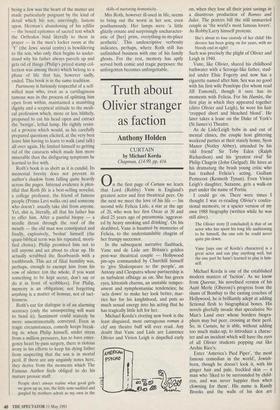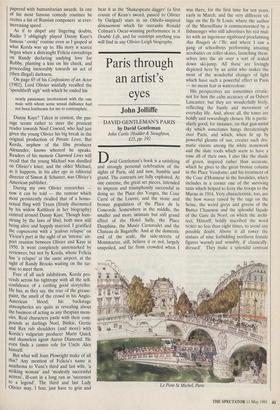Truth about Olivier stranger as faction
Anthony Holden
CURTAIN by Michael Korda Chapman, £14.99, pp. 416 0 n the first page of Curtain we learn that Lord (Robby) Vane is England's greatest actor and first theatrical peer. On the next we meet the love of his life — his second wife Felicia Lisle, a star at the age of 20, who won her first Oscar at 30 and died 25 years ago of pneumonia 'aggravat- ed by heavy smoking and drinking'. On his deathbed, Vane is haunted by memories of Felicia, to the understandable chagrin of her frumpy successor.
In the subsequent narrative flashback, Vane and de Lisle are Britain's golden post-war theatrical couple — Hollywood pin-ups commanded by Churchill himself to 'give Shakespeare to the people', an Antony and Cleopatra whose partnership is as turbulent offstage as on. She has green eyes, kittenish charms, an unstable temper- ament and nymphomaniac tendencies; he 'acts down' to make her look better, mar- ries her for his knighthood, and puts so much sexual energy into his acting that he has tragically little left for her.
Michael Korda's riveting new book is the least disguised, most outrageous roman a clef any theatre buff will ever read. Any doubt that Vane and Lisle are Laurence Olivier and Vivien Leigh is dispelled early on, when they lose all their joint savings in a disastrous production of Romeo and Juliet. The posters bill the still unmarried couple as 'the world's most famous lovers'. As Robby/Larry himself protests:
She's about to lose custody of her child! His divorce has been going on for years, with no bloody end in sight!
Such was precisely the plight of Olivier and Leigh in 1940.
Vane, like Olivier, shared his childhood bathwater with a Scrooge-like father, stud- ied under Elsie Fogerty and now has a cigarette named after him. Sex was no good with his first wife Penelope (for whom read Jill Esmond), though it sure has its moments with Felicia. For his Hamlet, the first play in which they appeared together (ditto Olivier and Leigh), he wore his hair 'cropped short and bleached blond'. He later takes a lease on the Duke of York's (St James's) Theatre.
As de Lisle/Leigh bobs in and out of mental clinics, the couple host glittering weekend parties at their stately home, Syon Manor (Notley Abbey), attended by his 'old friend' Sir Toby Eden (Ralph Richardson) and his 'greatest rival' Sir Philip Chagrin (John Gielgud). He hires as his dramaturg the brash young critic who has trashed Felicia's acting, Guillam Pentecost (Kenneth Tynan). Even Vivien Leigh's daughter, Suzanne, gets a walk-on part under the name of Portia.
I could go on. There were times I thought I was re-reading Olivier's confes- sional memoirs, or a spicier version of my own 1988 biography (written while he was still alive).
The Olivier story [I concluded] is that of an actor who has spent his long life auditioning to be himself, the one role he could never quite pin down.
Vane [says one of Korda's characters] is a great actor and can play anything well, but the one part he hasn't learned to play is him- self.
Michael Korda is one of the established modern masters of 'faction'. As we know from Queenie, his novelised version of his Aunt Merle (Oberon)'s progress from the slums of Bombay to the casting couches of Hollywood, he is brilliantly adept at adding fictional flesh to biographical bones. His novels gleefully invade that speculative No Man's Land over whose borders biogra- phers may but peer, crossing at their peril. So, in Curtain, he is able, without adding too much make-up, to introduce a charac- ter and an incident which will have the eyes of all Olivier students popping out like Archie Rice's.
Enter 'America's Pied Piper', 'the most famous comedian in the world', Jewish- born, though he doesn't look it, with his ginger hair and pale, freckled skin — a man who 'liked to be surrounded by child- ren, and was never happier than when clowning for them'. His name is Randy Brooks and the walls of his den are papered with humanitarian awards. In one of his most famous comedy routines he recites a list of Russian composers at ever- increasing speed.. .
As if to dispel any lingering doubts, Radio 3 obligingly played Danny Kaye's famous `-ovslcy' routine even as I gasped at what Korda was up to. His story is scarce begun when a distraught Felicia eavesdrops on Randy declaring undying love for Robby, planting a kiss on his cheek, and proceeding inexorably towards an act of (then illegal) darkness.
On page 65 of his Confessions of an Actor (1982), Lord Olivier wistfully recalled the `spendthrift sigh' with which he ended his
nearly passionate involvement with the one male with whom some sexual dalliance had not been loathsome for me to contemplate.
Danny Kaye? Taken in context, the pas- sage seems rather to steer the prurient reader towards Noel Coward, who had just given the young Olivier his big break in the original production of Private Lives. But Korda, nephew of the film producer Alexander, knows whereof he speaks. Readers of his memoir Charmed Lives will recall that the young Michael was dandled on Olivier's knee; and the older Michael, as it happens, in his alter ego as editorial director of Simon & Schuster, was Olivier's American publisher.
During my own Olivier researches now it can be told — the rumour which most persistently rivalled that of a homo- sexual fling with Tynan (firmly discounted by his widow Kathleen in her biography) centred around Danny Kaye. Though ham- strung by the laws of libel, both men still being alive and happily married, I gratified the cognoscenti with a 'jealous relapse' on Vivien's part at the sight of an 'intense' air- port reunion between Olivier and Kaye in 1950. It went completely unremarked by reviewers; but not by Korda, whose Felicia has 'a relapse' at the same airport, at the sight of Randy Brooks waiting on the tar- mac to meet them.
Free of all such inhibitions, Korda pro- ceeds across his tightrope with all the self- confidence of a rattling good storyteller. He has, as they say, the roar of the grease- paint, the smell of the crowd in his Anglo- American blood; his backstage atmospherics are quite as revealing about the business of acting as any thespian mem- oirs. Real characters jostle with their com- pounds as darlings Noel, Binkie, Gertie and Rex rub shoulders (and more) with Korda's vulgarian producer Marty Quick and shameless agent Aaron Diamond. He even finds a cameo role for Uncle Alex himself.
But what will Joan Plowright make of all this? Any mention of Felicia's name is anathema to Vane's third and last wife, `a striking woman' and `modestly successful actress', ill-cast in a long run as `successor to a legend'. The third and last Lady Olivier may, I fear, just have to grin and
bear it as the `Shakespeare dagger' (a first cousin of Kean's sword, passed to Olivier by Gielgud) stars in an Othello-inspired denouement which far outranks Ronald Colman's Oscar-winning performance in A Double Life, and far outstrips anything you will find in any Olivier-Leigh biography.



























































 Previous page
Previous page